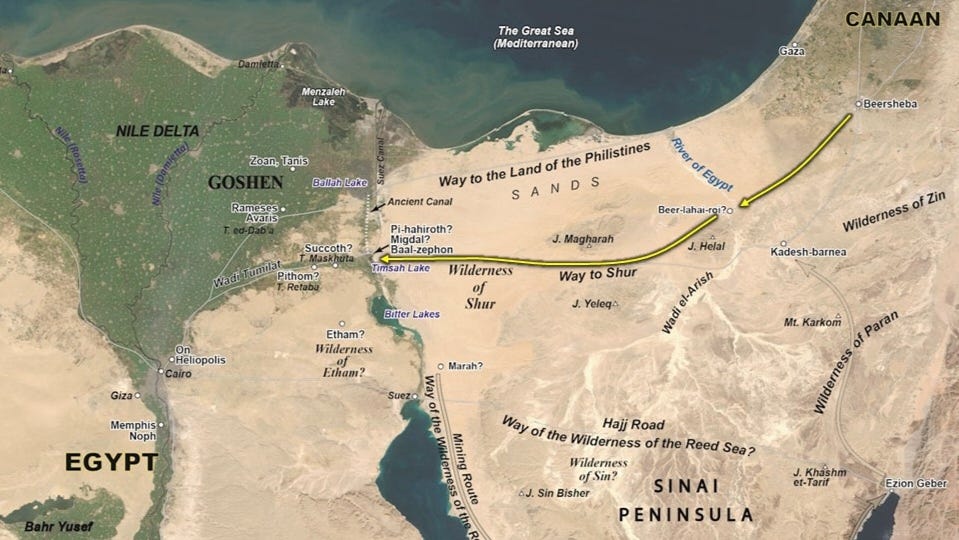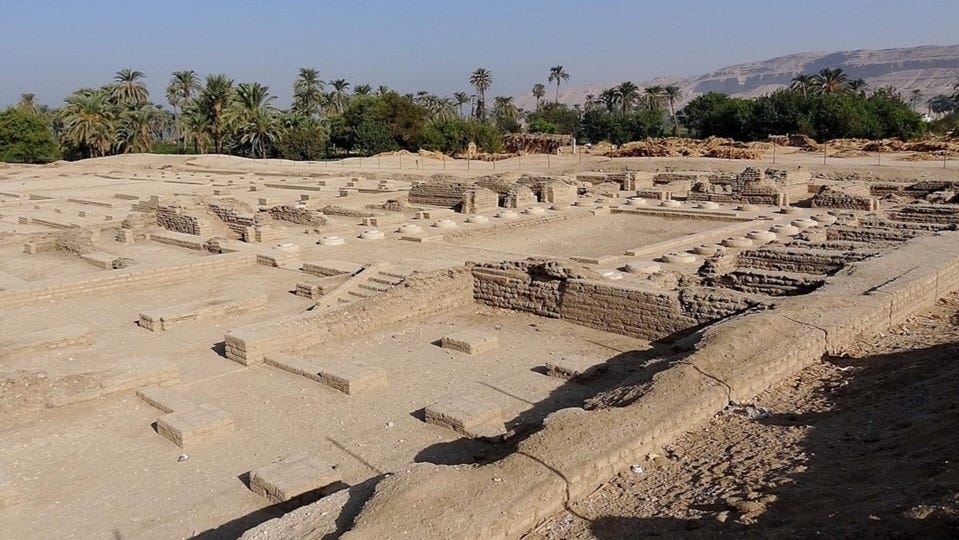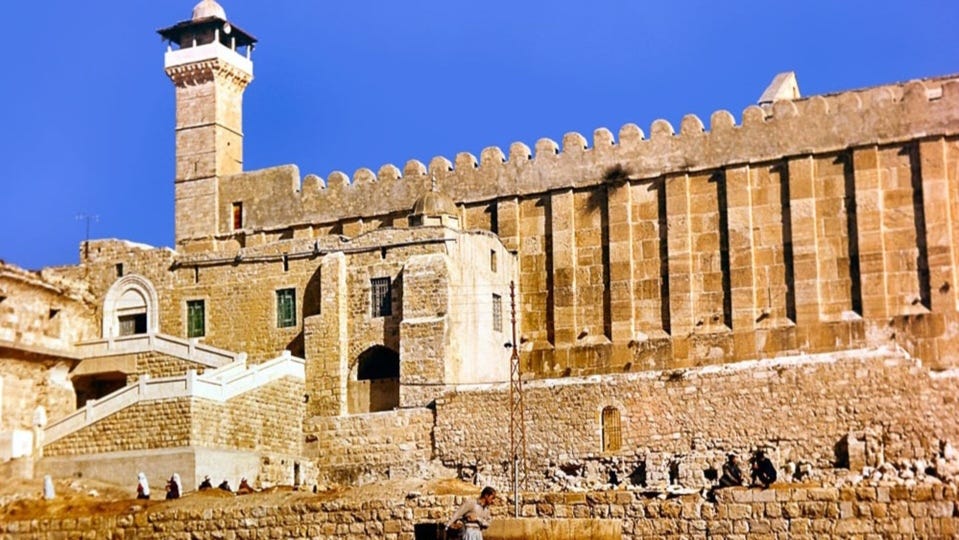Genesis 46 and 47: The Third Visit To Egypt
Joseph’s Forgiveness: A Testament to God’s Sovereignty and Redemption.
In the previous chapter, we saw Joseph revealing himself to his brothers in Genesis 43 to 45. Even through times of betrayal and hardship, God still worked on reconciliation and redemption. We see in Joseph's forgiveness towards his brothers who sold him into slavery that God's sovereignty can use evil actions for good. Joseph then tested his brothers by bringing Benjamin to Egypt, and this changed the hearts of his brothers since selling Joseph to Egypt in Genesis 37. Despite the brothers’ past, Joseph still forgave them and thus demonstrated God's mercy and love.
Jacob goes to Egypt
When we compare the two earlier visits to Egypt, the third visit seems a bit reflective of the past and the emotions of Jacob's impending death. But this visit is the most effective journey to Egypt, in which Jacob left Canaan, a land of promise, for Egypt, a land of future slavery. Was this move a mistake? No. Jacob's migration was not promoted just by Joseph's invitation; it was divinely authorised (Genesis 46:3-4. This verse records the only divine vision in the Joseph story, as in this Jacob is told 'to go down to Egypt' and is assured that 'I will go down...with you, and I will surely bring you back again' as we see in Genesis 28:15. So we can be assured that their stay in Egypt was to be only temporary; it was indeed part of the divine purpose, as we see the covenant which God made to Abraham in Genesis 15:13-14. This visit ends with Jacob enjoining Joseph to bury him with his grandfather and father (Abraham and Isaac) in Canaan (Genesis 47:29-30). Thus, promises were to be fulfilled.

Genesis 46:3-4 CSB: [3] God said, “I am God, the God of your father. Do not be afraid to go down to Egypt, for I will make you into a great nation there. [4] I will go down with you to Egypt, and I will also bring you back. Joseph will close your eyes when you die.”
Genesis 28:15 CSB: Look, I am with you and will watch over you wherever you go. I will bring you back to this land, for I will not leave you until I have done what I have promised you.”
Genesis 15:13-14 CSB: [13] Then the Lord said to Abram, “Know this for certain: Your offspring will be resident aliens for four hundred years in a land that does not belong to them and will be enslaved and oppressed. [14] However, I will judge the nation they serve, and afterward they will go out with many possessions.
Genesis 47:29-30 CSB: [29] When the time approached for him to die, he called his son Joseph and said to him, “If I have found favor with you, put your hand under my thigh and promise me that you will deal with me in kindness and faithfulness. Do not bury me in Egypt. [30] When I rest with my ancestors, carry me away from Egypt and bury me in their burial place.” Joseph answered, “I will do what you have asked.”
The Fulfillment of God’s Promises
Indeed, the promises were already well on their way to fulfilment for Jacob's family, which now numbered seventy, a sacred number (Genesis 10:2-31 READ NOW). Israel (Jacob) was on the way to becoming the 'great nation' promised to Abraham (Genesis 12:2) and promise to Jacob (Genesis 46:3). Most of the promises listed here were the ancestors of tribes and clans in ancient Israel, and readers would have immediately realised how the promises were fulfilled.
Genesis 12:2 CSB: I will make you into a great nation, I will bless you, I will make your name great, and you will be a blessing.
Genesis 46:3 CSB: God said, “I am God, the God of your father. Do not be afraid to go down to Egypt, for I will make you into a great nation there.
Joseph’s Reunion with Jacob: A Moment of Joy and Renewed Hope
The story quickly gets back to the human drama. As Joseph 'appeared' to Jacob, it felt like a dream to Jacob. He threw his arms around him, and Jacob then realized that Joseph was real and alive. This special encounter with his favourite son Joseph whom he had believed dead transformed his attitude to death. He then felt that he was ready to depart in peace (Luke 2:29), just as the resurrection of a 'greater Joseph' has allowed many to die in hope (1 Peter 1:3).
Luke 2:29 CSB: Now, Master, you can dismiss your servant in peace, as you promised.
1 Peter 1:3 CSB: Blessed be the God and Father of our Lord Jesus Christ. Because of his great mercy he has given us new birth into a living hope through the resurrection of Jesus Christ from the dead.
Joseph’s Wisdom and God’s Providence: Securing His Family’s Future
If we think that Joseph's reunion was the highlight of Jacob's desires, Joseph looked further ahead. He was the one sent to save lives, and he had to secure his brother's survival in Egypt. He further coached them as to what to say to Pharaoh, i.e. that they were not looking for jobs or food, that they were herdsmen who had brought their livestock with them and needed some grazing land, and that they would not be a burden to Egypt (Genesis 47:1-6). This approach was brilliant as the Pharaoh was glad to give them the best grazing land in Egypt and invited them to become royal stockmen, too. Once again, we are expected to recognise the unseen hand of God at work (Genesis 39:3, 21 and Genesis 41:37-38).

Genesis 47:1-6 CSB: [1] So Joseph went and informed Pharaoh: “My father and my brothers, with their flocks and herds and all that they own, have come from the land of Canaan and are now in the land of Goshen.” [2] He took five of his brothers and presented them to Pharaoh. [3] And Pharaoh asked his brothers, “What is your occupation? ” They said to Pharaoh, “Your servants, both we and our ancestors, are shepherds.” [4] And they said to Pharaoh, “We have come to stay in the land for a while because there is no grazing land for your servants’ sheep, since the famine in the land of Canaan has been severe. So now, please let your servants settle in the land of Goshen.” [5] Then Pharaoh said to Joseph, “Now that your father and brothers have come to you, [6] the land of Egypt is open before you; settle your father and brothers in the best part of the land. They can live in the land of Goshen. If you know of any capable men among them, put them in charge of my livestock.”
Genesis 39:3, 21 CSB: [3] When his master saw that the Lord was with him and that the Lord made everything he did successful, [21] But the Lord was with Joseph and extended kindness to him. He granted him favor with the prison warden.
Genesis 41:37-38 CSB: [37] The proposal pleased Pharaoh and all his servants, [38] and he said to them, “Can we find anyone like this, a man who has God’s spirit in him?”
Jacob Blesses Pharaoh: A Life of Struggles and Divine Purpose
Then Joseph introduced his father to Pharaoh. The elderly Jacob was carried into court and helped to stand before Pharaoh (this is the literal meaning of Genesis 47:7). Jacob was miserable, but Pharaoh showed great respect to him, asking about his great age, and was twice blessed by him. Despite the many sad episodes in his life (Genesis 47:9), Jacob was a very important person, the man of blessing through whom 'all peoples on earth will be blessed' (Genesis 28:14).
Genesis 47:7 CSB: Joseph then brought his father Jacob and presented him to Pharaoh, and Jacob blessed Pharaoh.
Genesis 47:9 CSB: Jacob said to Pharaoh, “My pilgrimage has lasted 130 years. My years have been few and hard, and they have not reached the years of my ancestors during their pilgrimages.”
Genesis 28:14 CSB: Your offspring will be like the dust of the earth, and you will spread out toward the west, the east, the north, and the south. All the peoples on earth will be blessed through you and your offspring.
Joseph’s Provision for Egypt: A Controversial but Life-Saving Strategy
Divine blessing on Egypt was immediately apparent through Joseph supplying the Egyptians with grain during the famine. Many modern readers of this section view Joseph's approach to the hungry Egyptians as cruel exploitation. Why did he not just give them food instead of demanding they exchange their herds, land and freedom for grain? This is not the way the Old Testament views the situation. Leviticus 25: 14-43 (READ NOW) shows that it was regarded as a great act of charity to buy the land of the destitute and to take them on as your employees (slaves). So such 'slavery' under a good employer was regarded by some as preferable to the risks of freedom (self-employment), and when offered freedom, some slaves refused to take it (Exodus 21:5-6 and Deuteronomy 15:16-17). Slavery in Old Testament times was very different from the harsh exploitation that was involved in the Atlantic slave trade of more recent centuries. Old Testament slavery, at its best, meant a job for life with a kind employer. Certainly, this was how the Egyptians viewed Joseph's actions, for they declared, 'You have saved our lives...we will be in bondage to Pharaoh' (Genesis 47:25).
Exodus 21:5-6 CSB: [5] “But if the slave declares, ‘I love my master, my wife, and my children; I do not want to leave as a free man,’ [6] his master is to bring him to the judges and then bring him to the door or doorpost. His master will pierce his ear with an awl, and he will serve his master for life.
Deuteronomy 15:16-17 CSB: [16] But if your slave says to you, ‘I don’t want to leave you,’ because he loves you and your family, and is well off with you, [17] take an awl and pierce through his ear into the door, and he will become your slave for life. Also treat your female slave the same way.
Genesis 47:25 CSB: “You have saved our lives,” they said. “We have found favor with our lord and will be Pharaoh’s slaves.”
The Growing Nation and the Coming Farewell of Jacob
This also gives a close glimpse of the promise being fulfilled as the Israelites 'were fruitful and increased greatly in number' (Genesis 17:2,6 and Genesis 28:3). It also contains a glance forward to the next section, the death and burial of Jacob, which we see in Genesis chapters 48 to 50. The anticipated death of Jacob we had often seen occurred in Genesis 6:5-8, Genesis 9:18-27, Genesis 37:36, Genesis 39:20, Genesis 41:57 and Genesis 45:28.

Genesis 17:2, 6 CSB: [2] I will set up my covenant between me and you, and I will multiply you greatly.” [6] I will make you extremely fruitful and will make nations and kings come from you.
Genesis 28:3 CSB: May God Almighty bless you and make you fruitful and multiply you so that you become an assembly of peoples.
Genesis 6:5-8 CSB: [5] When the Lord saw that human wickedness was widespread on the earth and that every inclination of the human mind was nothing but evil all the time, [6] the Lord regretted that he had made man on the earth, and he was deeply grieved. [7] Then the Lord said, “I will wipe mankind, whom I created, off the face of the earth, together with the animals, creatures that crawl, and birds of the sky #— #for I regret that I made them.” [8] Noah, however, found favor with the Lord.
Genesis 9:18-27 CSB: [18] Noah’s sons who came out of the ark were Shem, Ham, and Japheth. Ham was the father of Canaan. [19] These three were Noah’s sons, and from them the whole earth was populated. [20] Noah, as a man of the soil, began by planting a vineyard. [21] He drank some of the wine, became drunk, and uncovered himself inside his tent. [22] Ham, the father of Canaan, saw his father naked and told his two brothers outside. [23] Then Shem and Japheth took a cloak and placed it over both their shoulders, and walking backward, they covered their father’s nakedness. Their faces were turned away, and they did not see their father naked. [24] When Noah awoke from his drinking and learned what his youngest son had done to him, [25] he said: Canaan is cursed. He will be the lowest of slaves to his brothers. [26] He also said: Blessed be the Lord, the God of Shem; Let Canaan be Shem’s slave. [27] Let God extend Japheth; let Japheth dwell in the tents of Shem; let Canaan be Shem’s slave.
Genesis 37:36 CSB: Meanwhile, the Midianites sold Joseph in Egypt to Potiphar, an officer of Pharaoh and the captain of the guards.
Genesis 39:20 CSB: and had him thrown into prison, where the king’s prisoners were confined. So Joseph was there in prison.
Genesis 41:57 CSB: Every land came to Joseph in Egypt to buy grain, for the famine was severe in every land.
Genesis 45:28 CSB: Then Israel said, “Enough! My son Joseph is still alive. I will go to see him before I die.”
Application
The primary lesson we learn from Genesis 46 and 47 is that despite difficult times, God still keeps his promise and provides for his people. Through Joseph's power in Egypt, God gave care to his family, including Jacob, who thought Joseph was dead. This shows that God's restoration, despite our mistakes and hardships in the past, demonstrates God's provision for his people. Jacob's faith was still in God despite moving to a foreign land, and he trusted that God was still with him. As believers, we should trust in God, knowing that he is working behind the scenes in our lives for us, shaping us for His divine purpose and His glory.
Key Note
1. Genesis 46:1
On Beersheba (Genesis 21:14).
Genesis 46:1 CSB: Israel set out with all that he had and came to Beer-sheba, and he offered sacrifices to the God of his father Isaac.
Genesis 21:14 CSB: Early in the morning Abraham got up, took bread and a waterskin, put them on Hagar’s shoulders, and sent her and the boy away. She left and wandered in the Wilderness of Beer-sheba.
2. Genesis 46:4
'Joseph's hand will close your eyes' is a promise that Jacob would die in peace.
Genesis 46:4 CSB: I will go down with you to Egypt, and I will also bring you back. Joseph will close your eyes when you die.”
3. Genesis 46:12
Hezron and Hamul, the sons of Perez (Genesis 38:29), were presumably, like Joseph's sons (Genesis 46:27), born in Egypt. Benjamin's sons were also probably Egyptian-born (Genesis 46:21).
Genesis 46:12 CSB: Judah’s sons: Er, Onan, Shelah, Perez, and Zerah; but Er and Onan died in the land of Canaan. The sons of Perez were Hezron and Hamul.
Genesis 46:27 CSB: And Joseph’s sons who were born to him in Egypt: two persons. All those of Jacob’s household who came to Egypt: seventy persons.
Genesis 46:21 CSB: Benjamin’s sons: Bela, Becher, Ashbel, Gera, Naaman, Ehi, Rosh, Muppim, Huppim, and Ard.
4. Genesis 46:34
'Shepherds are detestable to the Egyptians' probably reflects a common distrust of nomadic peoples by urban dwellers (attitudes to gypsies and 'travellers' in modern society).
Genesis 46:34 CSB: you are to say, ‘Your servants, both we and our ancestors, have raised livestock from our youth until now.’ Then you will be allowed to settle in the land of Goshen, since all shepherds are detestable to Egyptians.”
5. Genesis 47:11
'The district of Rameses'. i.e. near the city of Rameses (Exodus 1:14 and Exodus 12:37), was another title for Goshen.
Genesis 47:11 CSB: Then Joseph settled his father and brothers in the land of Egypt and gave them property in the best part of the land, the land of Rameses, as Pharaoh had commanded.
Exodus 1:14 CSB: and made their lives bitter with difficult labor in brick and mortar and in all kinds of fieldwork. They ruthlessly imposed all this work on them.
Exodus 12:37 CSB: The Israelites traveled from Rameses to Succoth, about six hundred thousand able-bodied men on foot, besides their families.






